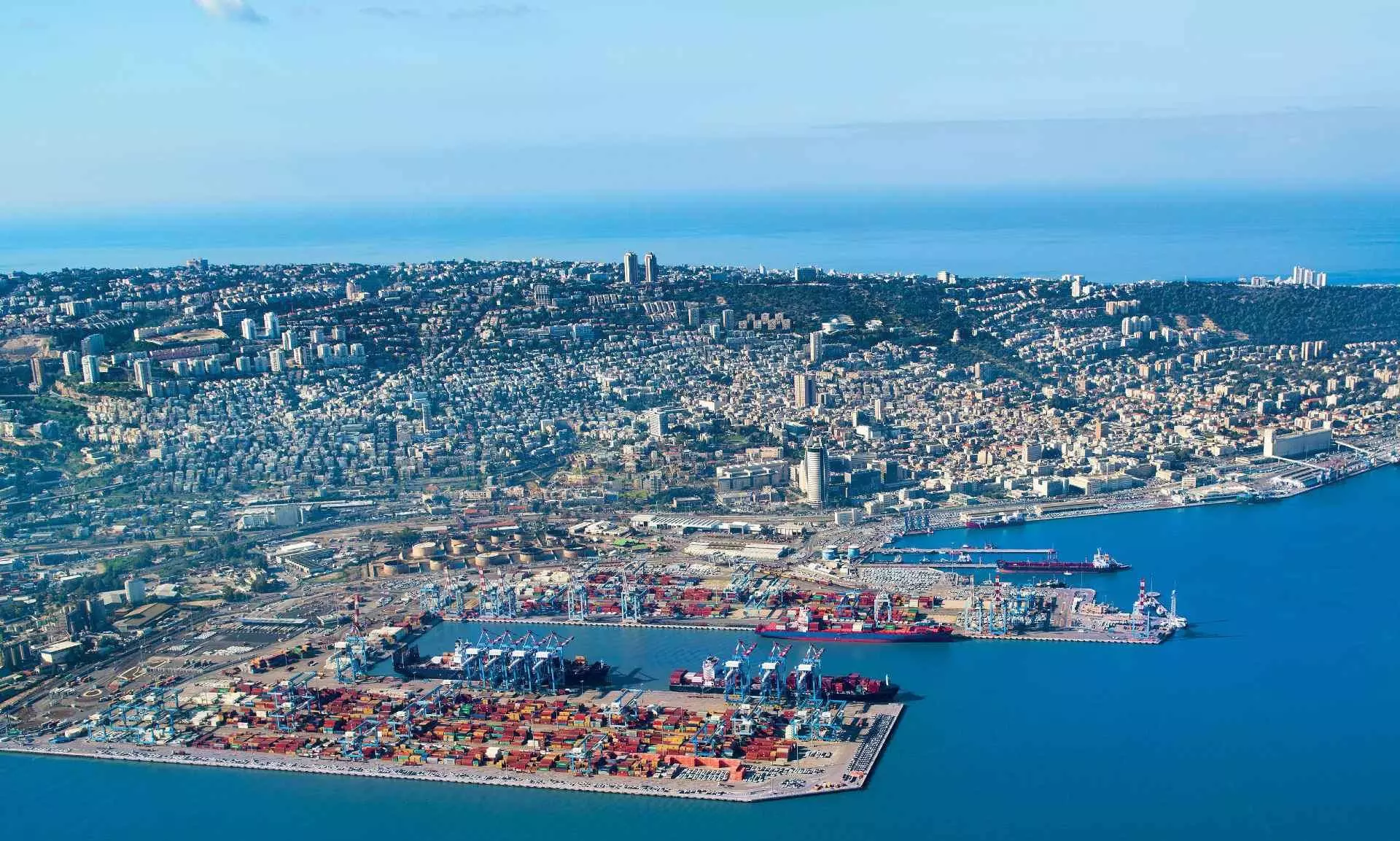IMEC: India's chance to manifest itself?

Port of Haifa, Israel
One of the most ambitious logistics projects ever imagined and with all the uncertainties around, IMEC holds the potential to transform global trade forever. And for India, it is the chance.
“One of the key advantages of this initiative is that it provides opportunities for sustainable trade development by reducing the dependence on existing trade routes primarily controlled by China. Currently, a significant portion of shipping services originate from Chinese ports, resulting in the cargo from the Indian subcontinent being subject to the availability of space on these services. This leads to fluctuations in freight transportation due to changing space availability.”
This is how K. Chandramohan, the founder and chairman of the project cargo specialist NTC Group, described India's need for a mega logistics project like the India-Middle East-Europe Economic Corridor (IMEC).
He said, “The introduction of a dedicated space guarantee through the IMEC project will bring much-needed stability to the freight industry.”
Furthermore, he opines that this service can function as a vital transhipment hub for all cargo originating from South East Asian or Indian Subcontinent regions, providing a seamless and reliable solution for cargo transit.
“In essence, the IMEC project has the potential to reshape the dynamics of global trade, reduce dependency on a single route, and offer stability and efficiency to the transportation of goods across the region,” he added.
On September 9, 2023, Indian Prime Minister Narendra Modi announced the launch of the mega infrastructure and connectivity project IMEC with an MoU signed between India, USA, Saudi Arabia, UAE, European Union, Italy, France and Germany on the sidelines of the G20 Summit in New Delhi.
The MoU reads, “The IMEC will comprise two separate corridors, the east corridor connecting India to the Arabian Gulf and the northern corridor connecting the Arabian Gulf to Europe. It will include a railway that, upon completion, will provide a reliable and cost-effective cross-border ship-to-rail transit network to supplement existing maritime and road transport routes – enabling goods and services to transit to, from, and between India, the UAE, Saudi Arabia, Jordan, Israel, and Europe.”
“One of the key advantages of this initiative is that it provides opportunities for sustainable trade development by reducing the dependence on existing trade routes primarily controlled by China.”
K. Chandramohan, NTC Group
Chandramohan is not alone in articulating the corridor's importance to India and its need above the existing trade routes. For instance, according to Pushpank Kaushik, chief executive officer of Jassper Shipping, IMEC stands apart from other alternatives, such as the current flow of goods through the Suez Canal or the planned route of the Chabahar Port.
He said, “Unlike the Suez Canal, which is susceptible to closures and disruptions due to political or environmental factors, IMEC offers more stable and secure trade routes. Furthermore, while the Chabahar Port is primarily intended to serve as a regional hub for Central Asian countries, IMEC will provide a more comprehensive and integrated transportation network, connecting India, the Middle East, and Europe.”
Kaushik thinks that IMEC can make made-in-India products more competitive in the global market.
As he puts it, “IMEC is poised to offer India a shorter and more efficient trade route to Europe and the rest of the world, resulting in reduced transportation and logistics costs, thus enhancing the competitiveness of Indian goods in the global market.”
He also opines that the corridor will increase investment between India, the Middle East, and Europe by providing faster transportation options for companies to expand across borders.
“The special economic zones along the corridor will attract businesses, create jobs, and drive economic growth,” he added.
On the same line, Rajesh Mehta, CCSO & executive director, Liladhar Pasoo Group, pointed out that the corridor will bring down the dependency on the Suez Canal and will also strategically position India at the centre of the corridor, connecting it to Europe and the Middle East.
“Currently, cargo movement from western Indian ports travels through the Arabian Sea, circles the Arabian Peninsula, enters the Gulf of Aden, sails through the Red Sea, and exits into the Mediterranean Sea through the Suez Canal. As per data, approximately 90 ships pass through the 193 km long and 200-metre-wide canal, on a daily basis. In 2022, over 23,000 ships traversed through the international waterways. Given this volume, the Suez Canal has now started facing issues in handling large ships, including the mega 24,000 TEU vessels. The average time to cross the canal has also increased to up to 16 hours, on average. Currently, the Suez Canal is the only exit available to the Mediterranean and is also a very long one - Mumbai to the port of Suez is about 3,195 nautical miles (about 6,000 km) and ships take on an average between 13-15 days at sea to reach. From the Suez Port to European ports, across the Mediterranean on traditional well-identified navigational grids is another long journey,” he observes.
In comparison to the longer distance and transit time via the southern Suez route and the northern Trans Asian Railway (TAR) route, according to Mehta, the IMEC is set to become the preferred corridor.
"Unlike the Suez Canal, which is susceptible to closures and disruptions due to political or environmental factors, IMEC offers more stable and secure trade routes.”
Pushpank Kaushik, Jassper Shipping
Beyond its economic benefits, Kaushik expects IMEC to have a positive impact on the political and strategic relationships between India, the UAE, Saudi Arabia, and Israel in an increasingly complicated geopolitical landscape.
“It will also strengthen India's ties with the Middle East, particularly with the UAE and Saudi Arabia,” he said.
This is very important, particularly in the context of the ongoing wars in the Middle East and Europe and as many people see it as a counter to China's Belt and Road Initiative, which allegedly circumvents India economically.
However, in an analytical piece produced by Container xChange, its co-founder and CEO Christian Roeloffs reminded, “The Israel-Palestinian conflict serves as a reminder of the uncertainties that ambitious trade projects like the India-Middle East-Europe Economic Corridor (IMEC) will face, which is perceived as a western counterpart to China's Belt and Road.”
In fact, United States President Joe Biden pointed out IMEC as one of the factors that influenced the October 7 attacks of Hamas on Israel, even though the White House later tried to water down the comment.
While there are geopolitical undertones, one particular benefit that Lalit Das, the founder and chief executive officer of the supply chain data analytics company 3SC Solutions observed is the easing out of regulatory compliances amongst the countries covered in the network.
For instance, the MoU reads, “Participants commit to work collectively and expeditiously to arrange and implement all elements of these new transit.”
Das said, “With organisations across the globe aiming to line their value chain operations with GHG emissions norms, the proposed network will contribute immensely to the pillars of efficiency, faster collaboration for enterprises with multi-geopolitical presence, and, of course, facilitating reliable and cost-effective channels.”
And, according to him, the two particular stakeholders who will benefit from this will be the multimodal logistics companies and conglomerates in the region who are seeking access to other regions.
He added, “Catalysing cargo movement, the channel will initiate seamless movements of goods, benefitting companies in their operation levels. More so, enterprises with multimodal transportation will stand to utilise the full potential of the IMEC corridor. The network will also prove advantageous to conglomerates in their overall operation as the corridor will enable them to procure raw materials, employment, and energy sources from the local region, proving cost-effective.”
“The network will also prove advantageous to conglomerates in their overall operation as the corridor will enable them to procure raw materials, employment, and energy sources from the local region, proving cost-effective.”
Lalit Das, 3SC Solutions
Above all the economic, political and regulatory benefits it brings, IMEC is a gigantic infrastructural upgrade for the entire landscape involved. It is not only about the logistics infrastructure but also all the supporting facilities that will come along with it.
For instance, the MoU also reads, “Along the railway route, participants intend to enable the laying of cable for electricity and digital connectivity, as well as pipe for clean hydrogen export. This corridor will secure regional supply chains, increase trade accessibility, improve trade facilitation, and support an increased emphasis on environmental, social, and government impacts.”
Thus Chandramohan opined that IMEC's potential is profound and can transform global trade.
“This ambitious endeavour acts as a catalyst for boosting worldwide economic growth, dramatically reducing trade times, and improving the efficiency of cargo transportation,” he said.
He added, “One concrete benefit it can provide is upgrading logistical infrastructure, including enhancements to rail, road, and maritime networks that connect nations. Additionally, by directing investments toward the establishment of warehousing and distribution hubs, there is significant potential to greatly improve the smooth flow of goods among partner countries.”
Chandramohan calls the project innovative and believes that it has the potential to reduce the time required for economic exchanges between India and Europe by an impressive 40 percent.
He added, “It aligns perfectly with India's ambitious goal of achieving robust GDP growth by evolving into a manufacturing hub and an export-oriented economy. The introduction of this corridor enables the logistics industry to prepare for long-term, assured freight services with extended validity.”
Meanwhile, agreeing with this potential and the tremendous changes it can bring, Kaushik had a message for the professionals in the logistics field.
He said, “IMEC will bring about significant changes in the trade and transportation landscape. To prepare for these changes, professionals should update their knowledge and skills in areas such as supply chain management, transportation planning, and risk management. It's also essential to stay informed about emerging technologies and trends in the logistics industry that can enhance efficiency and reduce costs. Building relationships with key stakeholders in the countries involved in IMEC will be crucial for logistics professionals to gain a better understanding of the local market and tailor their services accordingly.”
Although the project's size and intricacy are undeniable, it certainly has the potential to have a profound impact on the global economy, as it involves eight signatory nations that collectively represent a significant portion of the world's economic activity. And for India, it is a valuable proposition to manifest its real potential as it offers a dedicated space guarantee, a better trade route, competitive Indian products, a transhipment hub, increased investments, better geopolitical positioning, ease of doing business and ultimately the chance to become the manufacturing hub.
This article was originally published in Indian Transport & Logistics News' Nov-Dec 2023 issue.

Libin Chacko Kurian
Assistant Editor at STAT Media Group, he has six years of experience in business journalism covering food & beverage, nutraceuticals and now logistics. His current passion is to understand the nuances of global supply chains and their current turmoil. Outside work, he is also interested in philosophy, history, birding and travelling. Mail him: libin@statmediagroup.com Follow on LinkedIn


